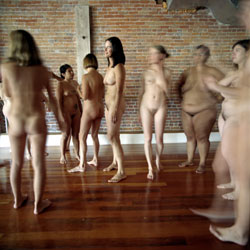The biggest problem with the multimedia bodyBODY: You Can’t Tell by Looking (through Sat., Feb. 12; Empty Space Theatre; 877- 278-4842) isn’t that the three aspects of the production fail to fully engage with each other—although that disconnect is certainly an issue—but the fact that none of them has anything new or intriguing to say about body image. Neither Amanda Koster’s photo exhibit nor Kathlyn Albright’s film nor Vanessa McGrady’s theater piece succeeds in adding anything to a dialogue that’s been ongoing for generations.
The second such collaboration by Koster, Albright, and McGrady, the production aims to further explore the issues addressed in 2003’s bodyBODY: Aphrodite Raves. McGrady’s personal experience with miscarriage served as the major impetus of that offering, and pregnancy is again a central issue of her contribution this time around, the “dark comedy” called You Can’t Tell by Looking. The writer/producer also appears in What a Body!, Albright’s documentary compendium of personal reflections, talking about how she felt both blessed and betrayed by her body throughout that brief pregnancy. I don’t begrudge McGrady her process, and certainly the entire production is evidence that these experiences take a great deal of time and effort to work through. But it’s also proof of how easy—and ineffectual—it is to cling to our painful past. Are we empowered when, time after time, we get together and discuss the abuse we suffered and the dysfunction we waded through? Are we empowered because all of us—tall, short, thin, fat, lumpy, and svelte—pose nude en masse (again) to celebrate our disparate incarnations of beauty?
Apparently not, and that’s the problem. Bemoaning our oppressive upbringings and attempting to re-form our ample figures is practically an American pastime. The major victory of Albright’s film, which is projected on a small screen above the stage and shown between scenes of McGrady’s play, is that it at least includes the perspective of women who have spent considerable time outside of the United States; Koster appears in the film (Albright uses many of the production’s cast and crew), relating that she finally felt “at home” in Brazil after being told that there’s no such thing as an overly large butt in that country. Because the film imparts the idea that struggling with one’s body image isn’t just an American luxury, this multicultural aspect is the one saving grace of the evening.
Koster’s photo exhibit, titled “This Is Beautiful,” also presents a varied image of the female form, and to that end, her efforts can be appreciated. But to wallpaper the inside of the theater’s lobby with glossy advertorial images and then contrast them with images of a handful of naked bodies dancing and smiling inside an empty, light-filled loft space certainly doesn’t give us a fresh perspective on anything. Koster’s photos, and the women she photographed, are beautiful indeed, and the mood created is positive, but the exhibit nonetheless feels small, mediocre, and overly familiar. Just because the media has failed to devise a new way of representing the American woman, must we fail to devise a novel way of responding to it?
Although they’re not saying anything original, the photography and film elements of bodyBODY are at least saying something. McGrady’s play, unfortunately, is so awash in mediocrity, and so loosely tied to the themes that Albright and Koster have tethered themselves to, that it’s almost impossible to guess what the message might be. As a family assembles to celebrate the father’s (G.S. Michaels) 60th birthday, we see that in this clan, as in many others, there is a good, pretty daughter (Angela Di Marco) and a wild, chubby daughter (Mercedes Creelman). Their emotional dramas and eating disorders are alternately repressed and blurted out over appetizers and birthday cake. There is absolutely no subtlety to the production—the characters are caricatures in order to get across McGrady’s elusive yet heavy-handed “message.” (The father is a plastic surgeon. Get it?) A blue-collar Irishman (David S. Hogan) in heavy pursuit of the “hot” sister crashes the party and ends up comparing the family’s drama to an Afterschool Special. He’s dead-on.
To applaud productions like bodyBODY in the name of being supportive to women is to trade change and real power for a fleeting, false sense of “empowerment”—and it’s an easy way to stay right where we are. We can do better than this.








